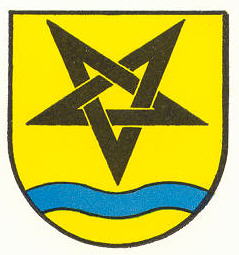Weiler/Rems: Difference between revisions
Knorrepoes (talk | contribs) m (Text replacement - "===Official blazon=== *(de) " to "{| class="wikitable" |+Official blazon |- |'''German''' | ") |
Knorrepoes (talk | contribs) m (Text replacement - ". ===Origin/meaning===" to ". |- |'''English''' | {{blazon wanted}} |} ===Origin/meaning===") |
||
| Line 14: | Line 14: | ||
| | | | ||
In Gold über einem erniedrigten blauen Wellenbalken ein gestürzter schwarzer Drudenfuß. | In Gold über einem erniedrigten blauen Wellenbalken ein gestürzter schwarzer Drudenfuß. | ||
|- | |||
|'''English''' | |||
| {{blazon wanted}} | |||
|} | |||
===Origin/meaning=== | ===Origin/meaning=== | ||
Revision as of 10:48, 5 July 2022
This page is part of the German heraldry portal Deutsche Wappensammlung |
Heraldry of the World |
|
German heraldry:
|
Selected collector's items from Germany:
|
WEILER/REMS
State : Baden-Württemberg
District (Kreis) : Rems-Murr Kreis (until 1973 Waiblingen)
Incorporated into : 1973 Schorndorf (Baden-Württemberg)
| German |
In Gold über einem erniedrigten blauen Wellenbalken ein gestürzter schwarzer Drudenfuß. |
| English | No blazon/translation known. Please click here to send your (heraldic !) blazon or translation |
Origin/meaning
The arms were granted on December 8, 1958.
The pentagram is already used as a village symbol as early as 1686, when it was used on borderstones of the village. In 1775 it was used as a symbol for the village in an official document. During the late 18th century however, the council only used the letter W.
The new seal in the 19th century showed the pentagram (image from 1843), this was used until the early 20th century, when the seal was replaced by a new one showing the arms of the Kingdom of Württemberg. This was replaced by the arms of the Volksstaat Württemberg and after its dissolution the council returned to the use of the pentagram. The first attempt to obtain arms was made in 1936 when the mayor applied for arms with a roof-tile, symbol for the tile manufacturing in the village. The State Archives then proposed to use the pentagram surrounded by three tiles. This was considered non appropriate by a council member, as the pentagram resembled the Jewish Star of David, which at the time was not considered proper. Although the star has six points, confusion had occurred already earlier in 1770 when the symbol was shown with six points. Due to the long discussion and the war no arms were adopted.
Finally in 1957 the local council adopted the old symbol with the addition of the Rems as a wavy bar in the base. Why the pentagram was chosen as a village symbol in the 17th century, however, is unknown.
Contact and Support
Partners:
Your logo here ?
Contact us
© since 1995, Heraldry of the World, Ralf Hartemink 
Index of the site
Literature : Gönner and Bardua, 1970












